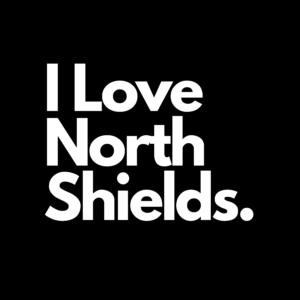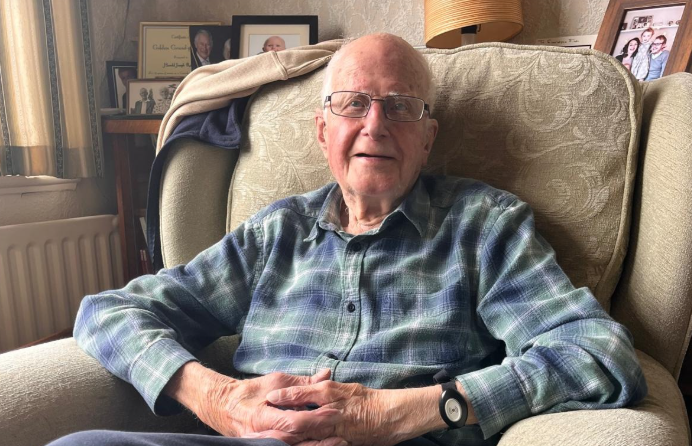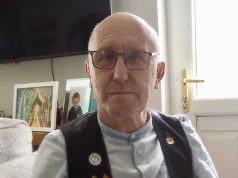Mim Robson met for a chat with her 101 year old Grandpa, Harold. Harold has lived on the North East coast for 77 years, was married to his beloved wife Joan for 68 years, and has raised 3 children here. He now has 7 grandchildren and a growing number of great-grandchildren. Mim asked him a few questions about what he has seen, experienced and learnt over his 101 years.
M: What have been the changes, the most significant changes that you’ve seen over your lifetime?
H: Well, all sorts of changes are quite significant I suppose… well we used to have trams in the streets, and trolley buses, and they’ve all gone out. I suppose there’s been an awful lot of gradual changes which in their own way are significant but…
M: I suppose then, to reword it, how would you say life is different now to how it was when you were in the first twenty or thirty years of your life?
H: It’s far more informal now, than it used to be. I think that’s one of the major things.
M: I suppose things like the internet have brought a lot of change to the outside world but it’s not really brought much change into this house.
H: That’s a good point. Obviously such things as internet, computers, all that sort of technicality of things have brought changes, and it depends whether you’re involved in it or not, because I haven’t really been interested in it. For instance, as you well know, I’ve not got a computer, I’ve not got a mobile phone, and I don’t need either of them.
M: I suppose one of the things you have got is a TV.
H: Yes, that was certainly a change. I can remember the first television we had, there wasn’t any colour, it was all just black and white.
M: What was it like seeing the TV for the first time, was it odd?
H: Exciting I suppose really, the fact that you could actually see things happening.
M: Was the cinema going when you were a child?
H: Oh yeah. The cinema was probably far more active than it is now. For instance I remember in Whitley Bay, there was a cinema at the top end of West Monkseaton, one in the middle of Whitely Bay, there was one, I don’t know if it’s there now, in the Spanish City area, so quite a significant change, really coupled with the advent and the increasing use of television, there was a decrease in cinema you see, because you could see it in your own front room.
M: And the cars have changed I guess? There will be more cars now…
H: Yes, the design of cars, and the quality, and of course quite a lot of makes of cars over my years have gone out of existence. I remember my father always had an Armstrong Siddeley, they were super cars. But again there were all sorts of cars, there was Austin, there was Rover, there was Morris. Rover, I’m not sure, does Rover still exist? They were typical of a lot of businesses over the period, where the smaller businesses couldn’t compete, and they were swallowed up by the bigger ones.
M: I guess that’s changed a lot too, when you were younger there were probably a lot more independent, small businesses…
H: Oh yes, yes very definitely, like the small green grocers shop for example. For several years, we got all our green groceries from a chap who came in his van. He would come and call and you would choose them on the spot and he would deliver straight in.
M: Was there a lot of that then, people selling from vans?
H: Quite a lot at that time – the greengrocer, there was a fishmonger, I don’t think the butchery trade did it that way, a baker. So quite a few… far more small one man operatives. They’d have everything in their van, and of course it was very convenient… they’d come round, and you could pop out and go into the van, see what he’s got, and deliver. That probably started going out of existence even in the 1950’s.
M: What about the seafront, do you think the seafront has changed a lot over the years?
H: In my time, the seafront has hardly altered at all. Except that for several years they had beach huts along the promenade, but they were being vandalised or not being used so much so the council took them away probably in the 1970s, something like that. It’s just been sort of gradual changes that you don’t really… the Spanish City now, behind the Spanish City where there is now a school, it was a permanent fairground, which you probably went to.
M: I did go to that. When you go down to Whitley Bay seafront you can see remnants of it as a sort of holiday town…
H: Oh yes, particularly there were times… like Glasgow Week, certainly not till the 60’s, possibly the 70’s, they had a holiday week, and there would be hundreds of people that would come down and holiday in bed and breakfast places in Whitey Bay. And of course, the beach used to be packed with people just having their picnics on the beach, and paddling, building sandcastles, it was a much simpler life, really.
M: Did you used to go down to the beach with your family and do that sort of thing a lot?
H: Yes, we would go down quite a bit. Mainly at the weekends of course. I suppose when the children were really young, I mean of course I would be at work, Grandma would meet other of our friends with young families, they’d have a picnic on the beach or…
M: I guess the Rendezvous Café, that’s not really changed that much over the years…
H: No it probably hasn’t, it’s very much as it was.
M: So… what are some of the most memorable or interesting moments of your life?
H: [long pause]… well there’s so many really… difficult to pick out, quite obviously various moments within the war years, they had a significant effect on me I think… I remember those…
M: Where did you go?
H: Well I was in Northern Ireland, then various places in England, mainly on the south coast area, and then of course I was in Italy, and then Greece, so all those are very much… significant in my life. And various occasions you remember, obviously getting married… [long pause] … creating a sandpit in the back garden of our first house for Ian… oh all sorts of items sort of stick out, you remember this, you remember that…
M What other memories can you think of?
H: Well I remember one of the things I loved to do as a boy, when I came up and holidayed up here, and then as an adult, was going up to the top of the lighthouse, and you could see how it worked, and all the rest of it. That was always good fun. And in those days, and I don’t think they do it now, you were allowed actually out onto the outer ring, you crawled out through a little doorway which was about that high, well that was always exciting.
M: Yeah they definitely don’t let you do that now. Did you used to get a certificate for climbing it?
H: I don’t think so.
M: I’ve got about three.
H: But of course in those days, also, they had an open air rock swimming pool, more or less opposite the bottom of Victoria Avenue, where the Rex Hotel is, if you go beyond there, around the corner, then down below there, that was quite a popular swimming area. The pool was probably not more than twice the size of this room.
M: Yeah, I think I’ve been there actually.
H: Yes you may well have been, because presumably the pool is still there, since its a natural formation.
M: Did you swim or paddle in the sea quite often?
H: Well with the children, yes, we used to go down there…. no, it was just part of life as it was… a simple existence.
M: Yeah, I think life’s got a bit too complicated.
H: Yeah, well you see going down and swimming in the sea or in the open air pool at Tynemouth, which still exists… more or less no water in it now… but, life was so much simpler in a way… and all the fairground activities in the Spanish City.
M: There was perhaps more sort of going and making your own fun I suppose.
H: Well changes are, over the years they’re quite significant, but at the time that they happen they’re so gradual that you hardly realise it, you know. I mean the fact that the greengrocer used to come down with his van and deliver on the spot, and the fact that you used to see far more travelling ice cream vans, well now they’ve turned be far more located permanently at a spot.
M: Big changes over… sort of incremental really. Because I was thinking it must have been a real shock for you to go into the first supermarket. But then I remembered that when I was younger the supermarkets were much smaller – they’re only now very big.
H: Yes, the change is gradual, gradual but quite significant at the time.
The conversation concludes next in next month’s issue with more memories and reflections from a long life on the North East coast.
If you have any memories about the topics discussed here, or thoughts on how life has changed over the years, do get in touch and share them at ilovebigboats@hotmail.com














